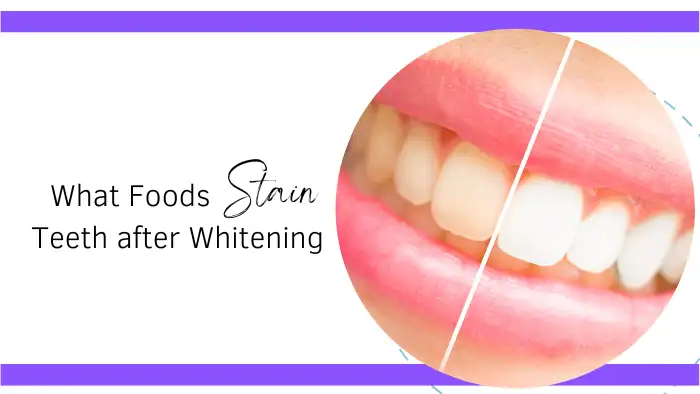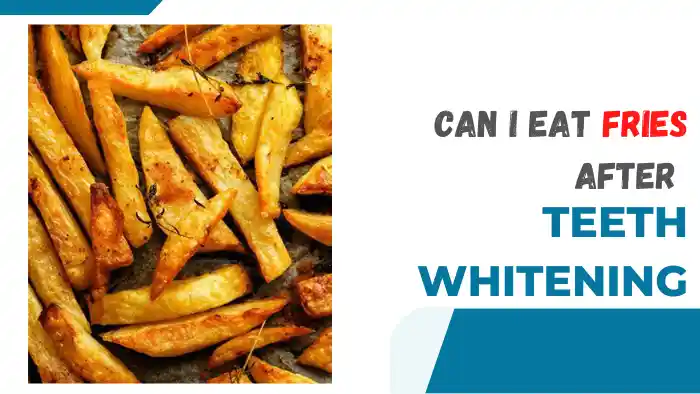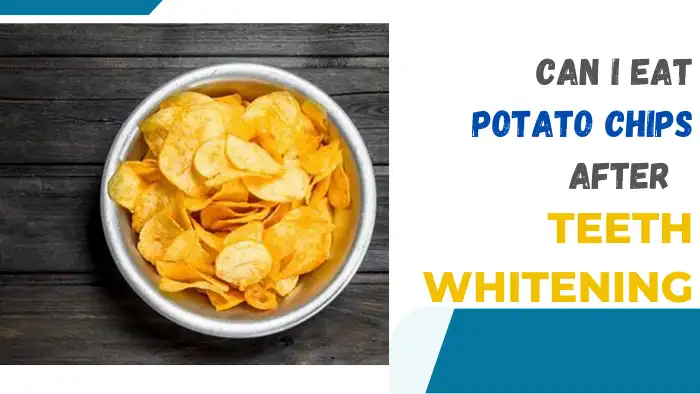Whitening your teeth can be an effective way to improve your smile, but it’s important to understand what can cause staining after the procedure.
Here is a comprehensive guide on what foods to avoid after teeth whitening to maintain your bright and shining smile.
After getting your teeth whitened, you might be wondering what foods to avoid to maintain your bright smile.
Certain foods and drinks can stain your teeth and undo the effects of teeth whitening treatments.
Knowing which foods to avoid can help you keep your teeth looking their best.
The Importance Of Maintaining White Teeth
Having a bright and white smile is more than just a confidence booster – it’s a reflection of good oral hygiene and overall health. When our teeth are stained or discolored, it can make us self-conscious and hesitant to show off our smiles. That’s why maintaining the whiteness of our teeth is so important.
Not only does having white teeth enhance our appearance, but it also helps us make positive first impressions. Whether we’re meeting new people or attending important events, a dazzling smile can leave a lasting impact on others. It shows that we take care of ourselves and pay attention to detail.
Furthermore, keeping our teeth white can have psychological benefits as well. Studies have shown that when we feel confident about our smiles, we tend to be more outgoing and sociable in social settings. It’s amazing how something as simple as the color of our teeth can influence our interactions with others.
From a dental perspective, maintaining white teeth indicates good oral health practices such as regular brushing, flossing, and routine visits to the dentist. By staying diligent with these habits, we not only keep stains at bay but also prevent other dental issues such as cavities and gum disease.
The Role Of Highly Pigmented Foods In Teeth Staining
Highly pigmented foods, such as berries, beets, and dark sauces, can contribute to tooth discoloration. These vibrant and delicious foods contain intense color compounds that have the potential to adhere to the enamel surface of our teeth.
Berries are notorious for their deep hues and health benefits. However, they also contain chromogens, which are pigment-producing substances that can latch onto the enamel layer. Similarly, beets with their rich purple-red color can leave a mark on your pearly whites.
Dark sauces like soy sauce and tomato sauce may add flavor to our meals but unfortunately also pose a risk for staining teeth. The dark pigments in these sauces easily cling to tooth surfaces over time.
Foods that Stain Teeth
After whitening teeth, it’s important to avoid certain foods that can cause staining.
Such as:
Berries

Berries, such as blackberries, blueberries, and raspberries, contain dark pigments that can stain teeth.
Even lighter-colored berries, such as strawberries, can cause staining due to their high acidity.
It’s best to avoid these fruits altogether, but if you do consume them, rinse your mouth with water immediately afterward.
Tomato Sauce
Tomato sauce is acidic and contains dark pigments that can easily stain teeth.
If you can’t resist a plate of spaghetti with tomato sauce, try brushing your teeth immediately afterward or rinsing your mouth with water.
Curry
Curry is a popular spice in Indian cuisine that contains turmeric, which is known for its bright yellow color. This color can easily transfer to teeth and cause staining.
To avoid this, limit your intake of curry or brush your teeth immediately after consuming it.
Balsamic Vinegar
Balsamic vinegar is a dark-colored condiment that can cause staining due to its acidity and pigmentation.
If you enjoy balsamic vinegar on salads or as a dipping sauce, try using lighter-colored vinegar instead.
Soy Sauce
Soy sauce is a popular condiment in Asian cuisine that contains dark pigments that can easily stain teeth. To avoid staining, try using less soy sauce or opting for a lighter-colored alternative.
Beets
Beets are a nutritious root vegetable that contains dark pigments that can cause staining. If you enjoy beets, try roasting them instead of boiling them to help reduce their pigmentation.
Overall, it’s important to be mindful of what you eat and drink after whitening your teeth to avoid staining.
By limiting your intake of these foods and taking steps to prevent staining, you can maintain a bright, white smile.
Pros and Cons:
Pros
- Awareness of foods that can stain teeth after whitening helps people take steps to minimize the impact of these foods on their dental health.
- Foods like apples, carrots, and celery act as natural toothbrushes by scrubbing away surface stains. Their high water content also stimulates saliva production, which helps to rinse away food particles.
- Dairy products contain calcium and phosphates that strengthen tooth enamel and protect against acid erosion. They also increase saliva flow, which aids in neutralizing acids produced by bacteria.
- Strawberries are known for their vibrant red color, they contain malic acid which acts as a natural whitening agent for teeth. Eating them in moderation can help remove surface stains.
- Staying hydrated with water is not only essential for overall health but also beneficial for oral hygiene. Drinking water throughout the day washes away food debris and dilutes the effects of acidic or pigmented drinks.
- This antioxidant-rich beverage has been found to inhibit plaque growth on teeth and reduce gum inflammation caused by bacterial infections.
Cons
- Avoiding certain foods can be difficult and may require significant changes to a person’s diet.
- Some of the foods that can stain teeth after whitening are considered healthy, such as berries and red wine, making it challenging to maintain a balanced diet while also protecting one’s teeth.
- Some people may feel restricted in their food choices and experience anxiety or frustration as a result.
- Drinks like coffee, tea, red wine, and soda contain chromogens that adhere to tooth enamel and lead to discoloration over time.
- Citrus fruits such as lemons and oranges have high acidic content that erodes tooth enamel. This can make them more susceptible to stains from other pigmented foods.
- Beverages like black tea and some types of alcohol (such as whiskey) contain tannins that promote staining by allowing chromogens in other foods or drinks to bind more easily with tooth enamel.
- Berries like blueberries, blackberries, and cranberries are packed with antioxidants but also leave behind dark pigments that can stick to teeth surfaces.
- Tomato-based sauces like marinara or soy sauce have intense colors due to their high pigment content. When consumed frequently or in large amounts, they can contribute significantly to tooth staining.
Foods That Are Safe to Eat After Whitening
After getting your teeth whitened, it’s important to be mindful of the foods you eat to avoid staining your teeth.
While some foods can cause discoloration, there are still plenty of options that are safe to eat after whitening.
Here are some foods to consider:
Plain Yogurt
Plain yogurt is a great option after teeth whitening because it’s low in sugar and doesn’t contain any artificial colors.
It also contains calcium, which is essential for strong teeth. You can add some fresh fruit or honey for a touch of sweetness.
Cheese

Cheese is another tooth-friendly food that’s safe to eat after whitening. It’s high in calcium and protein, which can help strengthen your teeth.
Plus, it doesn’t contain any artificial colors or added sugars. Try adding some cheese to a salad or eating it as a snack.
Milk
Milk is an excellent source of calcium and vitamin D, which are both essential for strong teeth. It’s also low in sugar and doesn’t contain any artificial colors.
You can drink it plain or use it to make a smoothie.
White Meat
White meat, such as chicken or turkey, is a great source of protein and doesn’t contain any artificial colors. Try grilling or baking it for a healthy meal.
White Rice
White rice is a safe option after teeth whitening because it doesn’t contain any artificial colors.
It’s also low in sugar and can be paired with a variety of proteins and vegetables for a balanced meal.
Why Teeth Whitening Can Lead to Staining
Teeth whitening works by removing surface stains and penetrating deep into the enamel to remove stubborn, set-in stains.
However, after the procedure, your teeth become more porous and susceptible to staining. This is why it’s essential to be mindful of what you eat and drink after teeth whitening.
Beverages That Stain Teeth after Whitening
- Red Wine
- White Wine
- Sports Drinks
- Soda
- Fruit Juice
Other Factors That Can Stain Teeth After Whitening
- Tobacco Use
- Poor Oral Hygiene
- Certain Medications
- Age Factor
Tips for Maintaining White Teeth after Whitening
- Rinse Mouth After Eating or Drinking
- Use a Straw
- Brush and Floss Regularly
- Visit the Dentist Regularly
- Consider Touch-Up Treatments
Conclusion
Avoiding dark-colored foods and drinks, sugary foods and drinks, acidic foods and drinks, and starchy foods can help to minimize staining after teeth whitening.
Additionally, rinsing your mouth with water, brushing and flossing regularly, using a straw, and drinking plenty of water can help to maintain your bright and shining smile.
Frequently Asked Questions
What foods can cause tooth staining after teeth whitening?
Foods that are dark in color, such as coffee, tea, red wine, and berries, can cause tooth staining after teeth whitening.
Can sugar cause tooth staining?
Yes, sugar can cause tooth staining by promoting the growth of harmful bacteria in the mouth.
Can acidic foods cause tooth staining?
Yes, acidic foods such as citrus fruits, tomatoes, and vinegars can cause tooth erosion, which can lead to tooth staining
Is it possible to prevent tooth staining from foods after whitening?
Yes, by avoiding or limiting your intake of staining foods and drinks, and practicing good oral hygiene, you can help prevent tooth staining after whitening.
Can I still enjoy staining foods after whitening my teeth?
Yes, you can still enjoy staining foods and drinks, but it is recommended to rinse your mouth with water after consuming them to help minimize their staining effects.
Will drinking through a straw help prevent tooth staining after whitening?
Drinking through a straw can help minimize the contact of staining liquids with your teeth, thus reducing the risk of tooth staining after whitening.

A Blogger, Author and Researcher! Gohar Aalam is recognized as a full-time blogger for Health and Tech Niches. I’m a Fountainhead of Gethealthup.com, will provides high quality knowledge.










1 thought on “What Foods Stain Teeth after Whitening – #1 Way to Find”